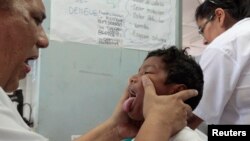The first vaccine marketed to prevent dengue fever could be making people sick, according to a new study. The authors are urging public health officials to consider carefully which individuals to vaccinate, to prevent severe illness.
An estimated 400 million people globally are infected each year with dengue fever, a mosquito-borne virus found most often in tropical regions. People who live in dengue-prone areas frequently are infected more than once, but most suffer relatively mild symptoms, including fever.
However, more than 2 million people each year develop a severe hemorrhagic case of the disease, which can be fatal.
Dengue is more severe the second time a person gets infected. About 25,000 people a year die as a result of the infection.
So when Dengvaxia — the first and, so far, only vaccine against dengue — was approved by regulators, there was much excitement.
Infections cut sharply
Large clinical trials — involving approximately 10,000 children, ages 2 to 14 — were conducted in Southeast Asia and in Latin America. Phase-three trials involved about 21,000 youngsters between the ages of 9 and 16.
Researchers found the Dengvaxia vaccine, made by pharmaceutical company Sanofi-Pasteur, reduced the number of infections by 60 percent and hospitalizations by 80 percent.
But as time went on, many of those who had been vaccinated, including the younger children, fell seriously ill with dengue.
Researchers at the Johns Hopkins Bloomberg School of Public Health in Baltimore, Imperial College London and the University of Florida analyzed data from all of the vaccine trials, involving more than 30,000 people in 10 countries, with long-term follow-up of the participants.
One of the study’s lead authors, Isabel Rodriguez-Barraquer of the Bloomberg school, said it appears the vaccine acts as a silent, first infection in some people.
“What seems to be happening with this vaccine is that those people who have never seen dengue in the past, that have never been infected in the past, if they get vaccinated, let’s say the vaccine acts like their first infection, right? So, if they ever get a second infection, or a true first infection, it would be more severe than it would have been, right? And that’s the concern,” said Rodriguez-Barraquer.
That may explain why young children, many under the age of 9, were getting severely ill. They hadn’t lived long enough to get a first infection.
WHO directive
The World Health Organization issued a warning not to give the vaccine to anyone younger than 9.
But after further mathematical modeling, Rodriguez-Barraquer and her colleagues learned it was not only young children who were becoming sick after being vaccinated; it was also people who simply had never had dengue before.
The data were reanalyzed, Rodriguez-Barraquer said, "and what we suggest is that … maybe having been exposed to dengue in the past, right, is more important than age itself."
The new analysis of the dengue vaccine was published in the journal Science.
In countries with a high prevalence of the disease, Rodriguez-Barraquer said, the vaccine should not be a problem. Investigators concluded Dengvaxia can reduce severe illness and hospitalizations by 20 percent to 30 percent in such places.
But in countries with a low prevalence, where only 10 percent of the population has been previously infected with dengue, the vaccine ought to be used with caution.
Best plan: Test first
Ideally, Rodriguez-Barraquer said, people should be tested before being vaccinated, to see whether they have been infected by dengue in the past.
Regulators in several countries, including Brazil, Mexico, Costa Rica, Paraguay and the Philippines, have approved Dengvaxia and are in the process of determining how best to roll it out.
If used carefully, Rodriguez-Barraquer said, Dengvaxia can help control dengue, but she also is interested in seeing how new vaccines fare in clinical trials now beginning.





